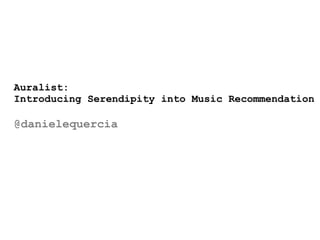Auralist: Introducing Serendipity into Music Recommendation
- 1. Auralist: Introducing Serendipity into Music Recommendation @danielequercia
- 2. U C L <who am i>
- 3. U C L daniele quercia
- 4. U C L
- 5. U C L
- 6. U C L
- 7. U C L
- 8. ╠²
- 9. ╠²
- 10. o ffline & online
- 11. Introducing serendipity in recommendations
- 12. Introducing serendipity in recommendations
- 13. ╠²
- 14. ╠²
- 15. ╠²
- 16. F ilter bubble (chilling idea ŌĆ” for some) Your content limited by your past& self-propagating interests
- 17. Goal: how to produce recommendations that are Accurate Diverse Novel Serendipitous
- 18. Auralist: framework broadening musical horizons ;) Basic Community-Aware Bubble-Aware Full
- 19. Basic Employs Latent Dirichlet Allocation (LDA)
- 20. LDA create virtual bins (latent topics) assign words to a bin (@ random) for each bin: select pair of words if co-occur more than chance: keep them in the bin else: put them into another bin (@ random) Facebook Twitter
- 21. LDA create virtual bins (latent topics) assign words to a bin (@ random) for each bin: select pair of words if co-occur more than chance: keep them in the bin else: put them into another bin (@ random) Facebook Twitter social econometrics
- 22. LDA create virtual bins (latent topics) assign words to a bin (@ random) for each bin: select pair of words if co-occur more than chance: keep them in the bin else: put them into another bin (@ random) Facebook Twitter social econometrics
- 23. LDA create virtual bins (latent topics) assign words to a bin (@ random) for each bin: select pair of words if co-occur more than chance: keep them in the bin else: put them into another bin (@ random) For each doc:
- 24. LDA create virtual bins (latent topics) assign words to a bin (@ random) for each bin: select pair of words if co-occur more than chance: keep them in the bin else: put them into another bin (@ random) For each doc: users user1, user2, ŌĆ” (who belong to a given community) artist
- 25. LDA create virtual bins (latent topics) assign words to a bin (@ random) for each bin: select pair of words if co-occur more than chance: keep them in the bin else: put them into another bin (@ random) The Beatles HolyBlood
- 26. LDA create virtual bins (latent topics) assign words to a bin (@ random) for each bin: select pair of words if co-occur more than chance: keep them in the bin else: put them into another bin (@ random) The Beatles HolyBlood diversity() diversity() similarity()
- 27. 1. Basic Auralist match( userŌĆÖs history, artist )
- 28. 2. Community-Aware balance * match( userŌĆÖs history, artist ) * diversity( artist )
- 29. 2. Community-Aware balance * match( userŌĆÖs history, artist ) * diversity( artist ) favors artists with broader fan bases e.g., The Beatles over HolyBlood
- 30. 2. Community-Aware balance * match( userŌĆÖs history, artist ) * diversity( artist ) favors artists with broader fan bases e.g., The Beatles over HolyBlood ŌĆ” but discounting for popularity
- 31. 3. Bubble-Aware The Beatles HolyBlood The Rolling Stones balance * match( userŌĆÖs history, artist ) * bubbleness( artist )
- 32. 3. Bubble-Aware balance * match( userŌĆÖs history, artist ) * bubbleness( artist ) favors cluster-avoiding artists by pushing the boundaries of a userŌĆÖs taste
- 33. 4. Full Auralist Rank interpolation of 1. 2. and 3.
- 34. d o they work?
- 35. ╠²
- 36. + + - - -
- 37. + - - + +
- 38. Both improve novelty, diversity and serendipity b ut with accuracy loss OK news!
- 39. Good news: accuracy loss can be minimised good bad
- 40. Good news: accuracy loss can be minimised good bad
- 41. User Study: Basic Auralist vs. Full Auralist Serendipity Enjoyment
- 42. User Study: Basic Auralist vs. Full Auralist Some: accept accuracy loss for serendipity Majority: favours of greater accuracy * serendipity IS a user-specific parameter
- 43. So what?
- 44. Future (well, current & you could help)
- 45. 1. Nudging Now: Auralist Next: ŌĆśNudgeŌĆÖ people for serendipity
- 46. social media language personality social media 2. Personality
- 47. language personality social media 2. Personality @ CSCW
- 48. 3. WhyŌĆÖs
- 49. 2 personality 1 nudging 2 whyŌĆÖs
- 50. 2 personality 1 nudging 2 whyŌĆÖs
- 51. @danielequercia
Editor's Notes
- notes
- notes
- notes
- notes
- notes
- notes



















































